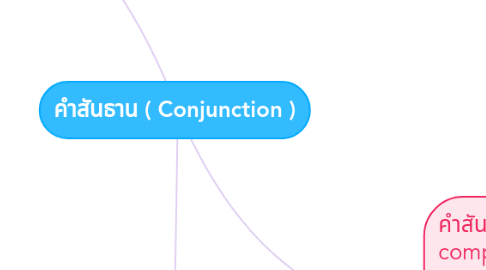
1. คำสันธานแบบคำคู่ ( paired conjunction)
1.1. both … and ( ทั้ง … และ …)
1.2. not only … but also ( ไม่เพียงแต่ … เท่านั้น แต่ยัง … อีกด้วย)
1.3. either … or ( ไม่…ก็…) , neither … nor ( ไม่ทั้ง … และไม่ทั้ง …)
1.4. I enjoy singing. I enjoy dancing. I enjoy both singing and dancing. Rice is grown in our country. Wheat is grown in our country. Both rice and wheat are grown in our country. Susan looked to the right before crossing the street. Susan looked to the left before crossing the street. Susan looked both to the right and to the left before crossing the street. Man needs food. Man needs shelter. Man needs not only food but also shelter. The teacher objected to the change in the curriculum. The students objected to the change in the curriculum.
2. คำสันธานที่ใช้เชื่อมประโยคที่สมบูรณ์สองประโยคเข้าด้วยกัน (coordinating conjunction)
2.1. 1) and ใช้แสดงความสัมพันธ์ของข้อมูลที่เสริมกัน ( showing addition) My husband and I are going to Rayong this weekend. My favorite pastimes are playing sports and listening to music.
2.2. 2) but, yet ใช้แสดงความสัมพันธ์ของข้อมูลที่ขัดแย้งกัน ( showing concession or contrast) These shoes are old but comfortable. Jane likes the piano but prefers to play the harpsichord. Carol is rich, but Robert is poor. Mr. Bartley came to the party, but Mr. and Mrs. O’Connor did not.
2.3. 3) or ใช้แสดงความสัมพันธ์ประเภทเลือกอย่างใดอย่างหนึ่ง ( showing alternatives) You can have the black kitten or the white dog. You can email or fax us the details of the program. She wants to watch TV or (to) listen to some music. My friends and I usually go to a party on Saturday night, or we go to the movies.
2.4. 4) nor, neither ใช้ในความหมายตรงข้ามกับ or กล่าวคือใช้แสดงความสัมพันธ์ในเชิงปฏิเสธ หมายถึง ไม่ทั้งสองอย่าง ( showing no alternatives) ขอให้สังเกตว่าเมื่อใช้คำว่า nor และ neither ซึ่งมีความหมายเชิงปฏิเสธนำหน้าประโยค จะมีการสลับที่ประธานกับกริยา กล่าวคือ จะวางกริยาไว้หน้าประธาน Laura has not left, nor is she planning to leave. These people are not insane, nor are they fools.
2.5. 5) for ใช้แสดงสาเหตุหรือเหตุผล ( showing causes or reasons) I went to bed, for I was tired. I’m taking an English class, for I want to improve my English skills. I’m afraid I can’t accept your invitation, for I have to go on a business trip to Japan.
2.6. 6) so ใช้แสดงผล ( showing results) Victor liked the necktie, so he bought it. She felt hungry, so she took a lunch break.
3. คำสันธานที่ใช้นำหน้าประโยคย่อยไม่อิสระใน complex sentence (subordinating conjunction)
3.1. 1) ข้อความแสดงลักษณะอาการ (manner) เป็นการอธิบายลักษณะอาการหรือเพิ่มเติมข้อมูลเกี่ยวกับลักษณะการกระทำในประโยคใจความหลัก
3.1.1. as ( ตามที่)
3.1.2. in a/the way that ( แบบ/ตามวิธีการแบบ)
3.1.3. like ( เหมือนกับ) , unlike ( ไม่เหมือนกับ)
3.1.4. as if/as though ( ราวกับว่า)
3.1.5. Please submit the report by January 16 as I requested earlier. He handled the situation in the way that I like. Like every other student, Ladda had difficulty with tenses. It looks as if it will rain tonight. Mary acted as though she saw a ghost.
3.2. 2) ข้อความแสดงสถานที่ (place) เป็นการอธิบายขยายความการกระทำ/เหตุการณ์ในประโยคใจความหลัก เพื่อให้ทราบว่าเกิดขึ้นที่ใด
3.2.1. where ( ที่ที่)
3.2.2. wherever ( ที่ใดก็ตามที่)
3.2.3. Put this document where it belongs. We will accompany you wherever you go.
3.3. 3) ข้อความแสดงเวลา (time) เป็นการอธิบายขยายความการกระทำ/เหตุการณ์ในประโยคใจความหลัก เพื่อให้ทราบว่าการกระทำ/เหตุการณ์ในประโยคนั้นเกิดขึ้นเมื่อใด ก่อนหรือหลังการกระทำ/เหตุการณ์ใน adverb clause
3.3.1. as/while ( ขณะที่)
3.3.2. as soon as ( ทันทีที่)
3.3.3. since ( ตั้งแต่)
3.3.4. until/till ( จนกระทั่ง)
3.3.5. when ( เมื่อ)
3.3.6. whenever ( เมื่อใดก็ตามที่)
3.3.7. before ( ก่อนที่)
3.3.8. after ( หลังจากที่)
3.3.9. soon after ( ภายหลังไม่นาน)
3.3.10. The woman slipped as she was getting off the train. While we are considering your request, you should prepare all necessary documents. I’ll leave for the funeral as soon as the meeting ends. The ASEAN summit has been postponed until the present crisis is over. When the rain stops, we’ll go out. Before you make your payment, you should contact our finance office. You’ll feel better after you’ve had some rest. I’ll come soon after I’ve finished my work.
3.4. 4) ข้อความแสดงเหตุผล (reason) เป็นการอธิบายขยายความเกี่ยวกับเหตุผลของการกระทำ/ เหตุการณ์ในประโยคใจความหลัก.
3.4.1. as/since/because ( เพราะว่า)
3.4.2. As I was feeling tired, I went to bed early. I see my parents quite often as they live near me. Since we had nothing better to do, we watched television the whole evening. We decided to go out for a meal since there wasn’t anything to eat in the house. Because it was raining heavily, I had to take a taxi home. I’m taking the English Grammar in Use course this semester because I want to
3.5. 5) ข้อความแสดงจุดประสงค์ (purpose) เป็นการอธิบายขยายความว่าการกระทำ/ เหตุการณ์ในประโยคใจความหลักมีจุดประสงค์ใด
3.5.1. so that/in order that ( เพื่อที่)
3.5.2. I’ll give her my email address so that she can contact me. I spoke very slowly in order that the students could understand what I said.
3.6. 6) ข้อความแสดงผล (result) เป็นการอธิบายผลของการกระทำ/เหตุการณ์ในประโยคใจความหลัก
3.6.1. so ( ดังนั้น) , so … that/ such … that ( มากจนกระทั่ง)
3.6.2. I have too much work to do, so I can’t go to my friend’s birthday party tonight. He worked so hard that he became ill. It was such lovely weather that we spent the whole day in the garden.
3.7. 7) ข้อความแสดงความแย้งหรือตรงกันข้ามกัน (concession/contrast) เป็นการให้ข้อมูลที่แย้งหรือตรงกันข้ามกับการกระทำ/เหตุการณ์ในประโยคใจความหลัก
3.7.1. although/though/even though ( ถึงแม้ว่า) , while/whilst/whereas ( ในขณะที่)
3.7.2. Although/Though/Even though it was cold, I went swimming. I like coffee while/whereas my husband likes tea.
3.8. 8) ข้อความแสดงการเปรียบเทียบ (comparison) เป็นการอธิบายเปรียบเทียบความต่างระหว่างการกระทำ/เหตุการณ์ใน adverb clause กับประโยคใจความหลัก
3.8.1. as … as ( เท่ากับ) , not as … as ( ไม่เท่ากับ) , -er/more … than ( มากกว่า) , -er/less … than ( น้อยกว่า)
3.8.2. There’s plenty of food, so please eat as much as you like. Jane is n’t as old as she looks. The government has taken this current crisis more seriously than ever. I have few er friends here than in my own country because I have less time to socialize (here than in my own country).
3.9. 9) ข้อความแสดงเงื่อนไข (condition) เป็นการอธิบายว่าการกระทำ/เหตุการณ์หนึ่งเป็นผลมาจากอีกการกระทำ/เหตุการณ์หนึ่งซึ่งเป็นเงื่อนไข โดย adverb clause เป็นส่วนที่แสดงเงื่อนไข และประโยคใจความหลักเป็นส่วนที่แสดงผลของการกระทำ
3.9.1. if ( ถ้า) , unless ( ถ้าไม่) , as long as ( ตราบเท่าที่
3.9.2. Please do not hesitate to call me if you have further questions. If I could afford it, I would buy a house. Unless Tim hurries, he will miss the bus. You can use my car as long as you drive carefully.
